Rituparno Ghosh’s Raincoat is a beautiful film. The film is inspired by a story of O Henry called the Gift of the Magi. The story is about a married couple, Jim and Della, and how they deal with buying Christmas gifts for each other, with their limited means. They both sacrifice their prized possessions to buy gifts to show how priceless is their love. Adapting to an Indian setting, Raincoat is about Mannu (Ajay Devgn) and Niru (Aishwarya Rai). They grew up in the same neighborhood and were lovers once. Due to Mannu’s poor financial condition, Niru marries another guy. It is now six years later. Mannu has lost his job and needs money to start his own business. Niru, now a married woman, is dealing with her own financial problems as her husband suffered huge financial losses. She is also struggling to make ends meet. Mannu goes to visit Niru; they reminisce about the past, and make up stories about their perfect life. In the end, like it happens in the Gift of the Magi, a surprise gift awaits the both of them.

In one of the film’s songs, Mathura Nagarpati, the lyrics ask Lord Krishna as to why is he going back to Gokul. Krishna was raised in Gokul by Yashodha and Nanda. He went to Mathura where he killed his evil uncle Kansa and became the ruler of Mathura. The song talks about why he wants to leave this great kingdom and go back to Gokul to his old love. His beloved Radha is a married woman who has moved on, then, why bring back the painful memories again. Why can’t he forget her and move on?
Tumhari priya ab puri gharvaali,
Doodh navan ghivoo din bhar khaali,
Biraha ke aansoon kab ke ponch daali,
Phir kaahe dard jagao,
Mathura Nagarpati kahe tum Gokul jao.
The girl you loved (Radha) is a married woman,
Busy all day with taking out milk, cream, ghee,
She wiped away the tears of separation long back
Why do you want to evoke that pain again?
Krishna, why do you want to go to Gokul?
Although the song is ostensibly about Krishna and Radha, it mirrors the life of Mannu and Niru. Mannu and Niru are like Krishna and Radha. They were lovers once. But now a lot has changed. Niru is married to someone else and is busy with her life. In the beginning of the film, Mannu’s friend Alok tells him to not go to Niru’s place. Alok reminds him that he took him out to watch the same film again and again so that he can move on. Mannu’s mother also tells him to not visit Niru. In the final moments of the film, Alok’s wife Sheila tells him that women are practical. She says that at that time, Niru’s husband would have come back home and she would be busy with him. Mannu believes that Niru would be reminiscing about him, but it is not like that. Niru would be busy with her own issues and she won’t be thinking about him. Tumhari priya ab puri gharvaali, doodh navan ghivoo din bhar khaali. Yet, Mannu will take a journey to go and meet Niru—his Radha. Thus, we see a playing out of the song in the story of Mannu and Niru. Like the eternal love between Radha and Krishna who could not be together, but formed a lifelong bond, Niru and Mannu share the same bond. Even after years, they still love each other. There is a leitmotif of Radha-Krishna in the film’s other songs as well.

There is a deep poignancy in Raincoat‘s songs that is very touching. Every song of the film is layered with melancholy and loneliness. All the songs tell their own short story within themselves. Majority of the songs have been penned by the inimitable Gulzar, while a few have been written by Rituparno Ghosh himself. Shubha Mudgal has sung these beautifully. Whenever I think about Shubha Mudgal, the first thing that comes to my mind are the rains. Not only because of Ab Ke Saawan, but also because her songs have a certain nostalgia that reminds us of our past, like the same feeling one gets when he is listening to music when it pours outside. It is noteworthy that the film uses a powerful voice as Shubha Mudgal’s in the background score. Piya Tora Kaisa Abhimaan is lovely, but my favorite is Akele Hum Nadiya Kinare, a song filled with so much loneliness.
Maajhi tora naam to bata,
Phir kaise pukare tujhe, kaise pukare,
Akele hum nadiya kinare.

Niru left Mannu because her parents fixed her wedding with someone who could provide her security in life. Niru had not seen the man she was marrying even once before her wedding. She married her [unnamed] husband for financial security. Mannu’s financial condition was not strong enough to take care of her. The film never judges Niru for her decision to marry someone rich. She did what she had to do. More than often, humans make choices which they think are the best for them at that point. The consequences of those choices are experienced only later. Hindsight is a wonderful thing, but as Max Baucus said, one cannot operate by hindsight. Even when Niru and Mannu are lying to each other, there is never a judgment on either of them. We understand their reasons of doing so and we don’t judge them and their actions. However, there is a point in the film where it feels that the film wanted Mannu to have shown more himmat to convince Niru. When Niru is getting married, he comes and tells her that he has arranged the loan of the car that she wants. Niru tells him that she has known him for eight years, and he has shown his himmat only a day before her wedding. Later, the landlord also tells Mannu, “Agar kaleje me itna zor nahi tha toh kahe ki mohabbat.” If you did not have guts, then, why get into romance? It is here that it feels that like Mannu should not have given up so easily after all what is the point of love if you don’t fight for it.
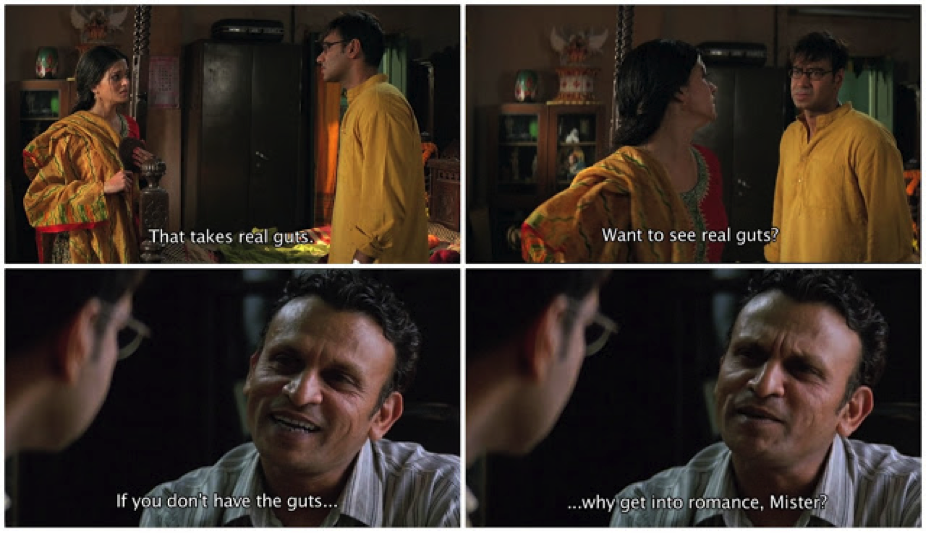
There is an early point in the film when Mannu is crying in the bathroom. Sheila listens to his crying from the outside, and, later tells him that he should put the shower on so that no one can hear him crying. The bathroom makes an appearance a few other times in the film. On being asked as to why does she not travel with her husband, Niru says that she is afraid she will get locked in a bathroom on the plane and no one will help her to bring her out. Mannu laughs at her. Later, this bathroom again comes back. Niru tells Mannu that she wants to leave everything and fly away somewhere. Even if she is stuck in the bathroom of the plane, at least, she will go somewhere with it. She is locked even today, so, what if she is stuck in the bathroom. Mannu tells her that one cannot be locked in a bathroom forever; someday someone will come and open the door for her. Thus, both of them get their own bathroom scenes. He locks himself up and cries in the bathroom; she feels trapped in her house as if she is locked in a bathroom and wants to fly away. He has not moved on from his past and not married, still locked in the memories of the past, while she is locked in the burden of perpetual poverty. There is an element of entrapment and loneliness in Niru, like Charu had in Charulata. As José Arroyo writes about Charulata, “The film’s windows are closed off against the heat but seem semi-barred and begin to suggest a prison. She hears a bird. She’s framed by her house, sumptuous but overwhelming in its immensity: it takes her a while to get to the drawer holding her opera glasses. Finally, she peeks at the world outside, with its music and it drums, its workers. Life is available to Charu only through opera glasses and barred windows.” Likewise, we get the feeling that Niru is trapped in her house, and here too, she keeps all the windows of her home closed as if she is in a prison.
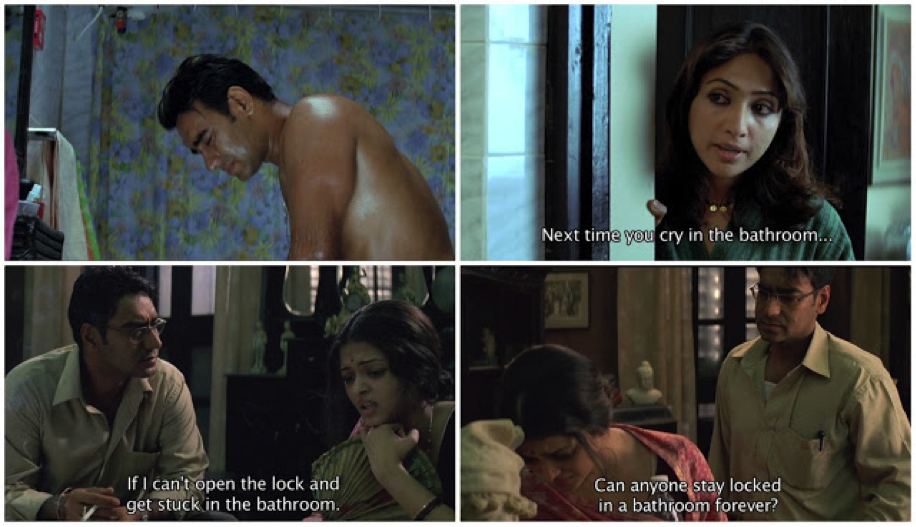
The film’s title Raincoat is given as it plays an important part in the film. The raincoat that Mannu wore had the letter that talks about his hardships, which Niru reads when she wears it to bring food for him. It is kind of ironic that a garment that is worn to hide and protect becomes the very medium through which something is revealed. Hence, the title is significant. In one of the pockets of the raincoat, Niru put her own jewellery so that she can help Mannu in her own way. Mannu only finds about it later when he reaches home. This is a classic trope of surprise endings in the oeuvre of O Henry as we saw in another recent adaptation of his story in Lootera. And, as in Lootera, there is a feeling of melancholy in the principal characters the film.
There is a point in the film where Mannu says that he has not come to break Niru’s marriage. After this stage, we hear a lovely song in the background. The song is Meri Jaan Mujhe Jaan Na Kaho and was originally sung by Geeta Dutt for the film Anubhav (1971). Directed by Basu Bhattacharya, Anubhav is the story of the relationship of Amar (Sanjeev Kumar) and Mita (Tanuja), a married couple, who, after six years together, are trying to spice up their marriage. Mita is unhappy as her husband is always working. She tries to be intimate with him. However, Meeta’s ex-lover Shashi re-enters Meeta’s life, and finds a job in the same organization as Amar, throwing her marriage again in jeopardy. Anubhav was the first in a trilogy of Basu Bhattacharya films based on marital relationships in contemporary urban India. There is a lovely dialogue in that film where Amar tells Shashi, “Beeta hua kal aaj hamare beech tabhi aata hai jab hum aaj ko puri tarah jee nahi paate.” The past memories come between us when we are not fully able to live in the present. Rituparno Ghosh pays homage to the rain song from Anubhav, which also fits beautifully with Raincoat‘s own narrative. The song has beautiful lyrics by Gulzar, and has many possible interpretations.
Sookhe saawan baras gaye, itni baar in aankhon se,
Do boondein na barsein, in bheegi palkon se.
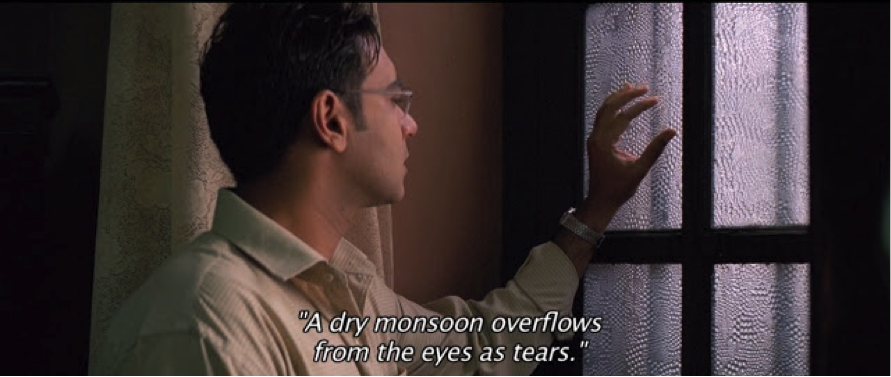
It is kind of funny that when we meet people after a long time, we expect them to change as the general expectation is people change with time. However, if two people had been meeting all the while, the change is not observed and the expectation of change diminishes. Niru tells Mannu that he has changed a lot in appearance and as a person. He has become darker, has lost weight, and has become quieter and more pensive. He tells her that she has not changed and she is still the same as she was earlier. The two of them still remember a lot of their memories of past. They still have feelings for each other. She still feels jealous when he talks about any girl, be it his secretary or his fiancée.
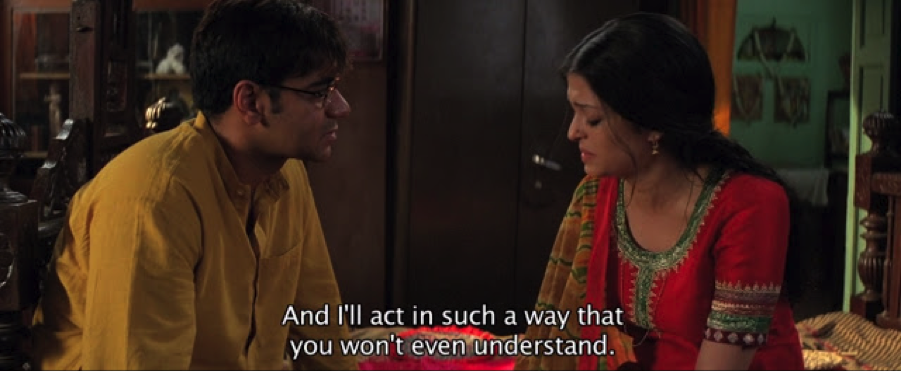
Rituparno Ghosh creates some beautiful layered moments in the film which are hard to explain in words. When Mannu pays the rent for Niru’s house, the landlord asks him that aapka prayashit hai ya prathishodh. Is it his penance or revenge? He does not answer and he remembers the time when Niru was getting married and she had told him that if they ever meet again in life, she will act happy and he won’t get that she is acting. This is what she actually did when they met again. At some other point, Mannu tells Niru that since she wants a car with the same color as that of her bangles, he will fill it with roses so that the colors match. Niru advises Mannu to name his production house after her as this way they could become partners in life in some way. All through the film, the strap of Niru’s bra is visible, perhaps, related to the comfort that they both had in each other’s company. Niru’s house is full of old antique furniture, symbolizing the memories of the past that they are still harboring in their hearts.
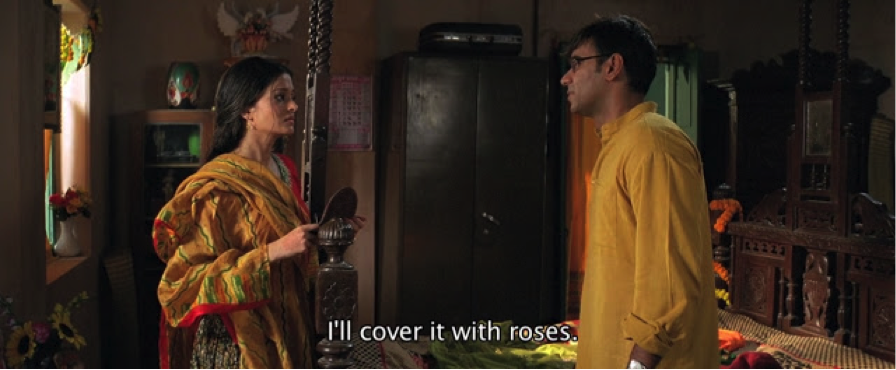
The character of Sheila was also a lovely one. She has her own background story where she did not get to marry the person she loved. The two women in the film get married to people who were not their lovers. Perhaps, this is why Sheila is always sympathetic to Mannu as she understands the pain of unrequited love. She is also far more practical. She might still miss her old lover in some moments, but she has moved on with grace and closed that chapter of her life. Biraha ke aansoon kab ke ponch daali.
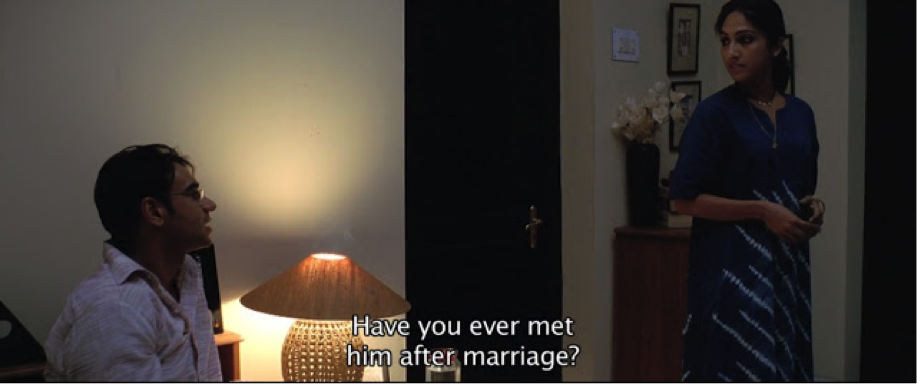
There are quite a few interesting references in Raincoat. In the bathroom of the house of Alok and Shalini, there is a poster of Sophia Loren. Not entirely sure about its context, perhaps, it is some film connection which I am not able to find. At different points in the film, songs from other films are used. When Niru and Mannu are getting ready to watch an adult film, Sau Saal Pehle starts playing. When Niru is getting married, Mere Haathon Mein starts playing. When Mannu goes to meet Niru at her house when they were in Bhagalpur, Jhoomka Gira Re starts playing. It is also worth mentioning that in the film’s opening credits, all actors are called ‘players’.
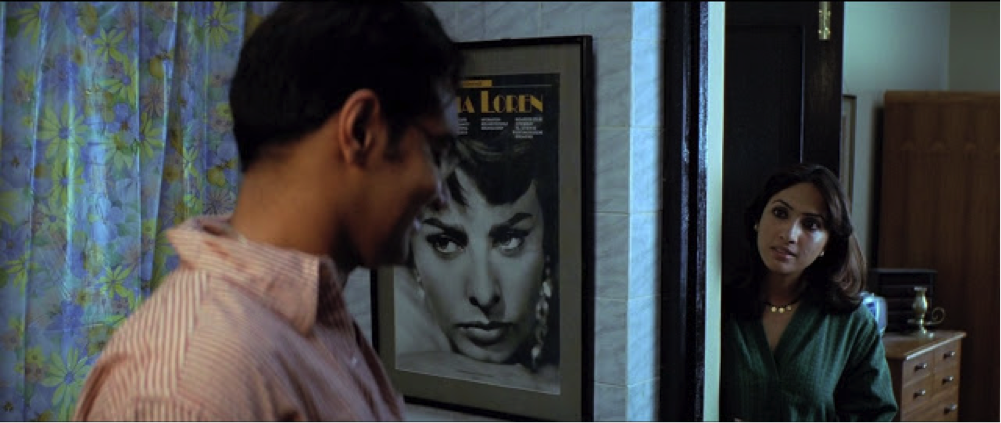
Sophia Loren

When he is narrating about his business plans, Mannu tells Niru that he plans to name his production house as “Rajni Productions”, after the old TV show Rajani. He adds that his numerologist told him to change the name as a five-letter word is unlucky. He says he is planning to write it as Rajnee. But the fact is the original TV show was called Rajani and already had six letters. Years later, this would come true in some other form when Ajay Devgan would change his name to Ajay Devgn.
Shot in record sixteen days, Raincoat is Rituparno Ghosh’s first Hindi film. Aishwarya Rai and Ajay Devgn give fabulous performances. They both look the part and channel the pain and the suffering of Niru and Mannu beautifully. They are ably supported by Mouli Ganguly and Annu Kapoor. The film’s music and lyrics by Debojyoti Mishra and Gulzar add to the film’s beauty. Over the years, the film has become a classic and even after so many years, it does not feel dated.
Raincoat is a story of love; of the façades that we wear to pretend that we have moved on from that love. But in reality, there is still a lot of love left, and one can never really move on completely. There is always a corner of the heart where this love continues to stay. And, someday, a torrential downpour will bring back the memories of this love, and then, even a raincoat won’t be enough leaving us drenched in the myriad emotions of happiness and sadness.
[Read more of the author’s work on his blog at http://dichotomy-of-irony.blogspot.in]






Leave A Comment
You must be logged in to post a comment.